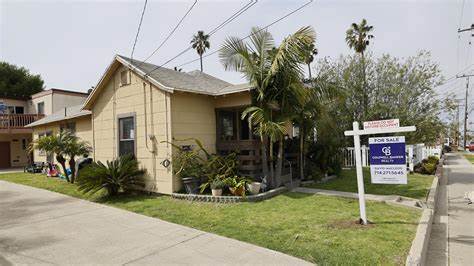American homeowners find themselves in a unique economic scenario characterized by substantial home equity yet constrained by the challenges posed by soaring mortgage rates. Recent data published by the Mortgage Bankers Association (MBA) underscores this paradox, revealing that despite homeowners collectively holding a record $17 trillion in equity, refinancing activity declined by 2% last week. This trend persists as mortgage rates hover near their highest levels in nearly two decades, dampening the enthusiasm for leveraging home equity through refinancing.
Joel Kan, Vice President and Deputy Chief Economist at the MBA, pointed out that the decline in refinance applications over the past four consecutive weeks correlates closely with the upward trajectory of mortgage rates. This trend reflects the economic reality where higher borrowing costs have dissuaded many homeowners from pursuing refinancing opportunities that could potentially offer lower interest rates, reduced monthly payments, or shorter loan terms.
CoreLogic’s data reinforces the magnitude of homeowners’ equity gains, showing a robust increase of nearly 10% in equity holdings to $17 trillion by the end of the first quarter of 2024. On an individual level, this equates to an average gain of approximately $28,000 per borrower since the onset of 2023. Selma Hepp, Chief Economist at CoreLogic, underscored the pivotal role of home equity as a financial buffer for homeowners navigating the escalating expenses associated with homeownership, such as insurance premiums, property taxes, and homeowners association fees.
Refinancing remains a critical financial strategy that allows homeowners to replace their existing mortgages with new loans that offer more favorable terms. However, despite the substantial increase in home equity, the attractiveness of refinancing has been tempered by the persistent elevation of mortgage rates. Even though the average rate for a 30-year mortgage saw a marginal decrease to 7% last week from 7.03%, it remains significantly higher than the historically low levels experienced during the pandemic, which hovered around 3%.
Economists anticipate that mortgage rates are likely to remain elevated throughout much of 2024, influenced by broader economic conditions and Federal Reserve monetary policy. Prospects for rate cuts by the Federal Reserve may provide some relief in the future, yet experts caution that any potential decreases are unlikely to return rates to pre-pandemic lows in the near term.
The prolonged period of high mortgage rates has reverberated across the housing market, contributing to what economists describe as a “golden handcuff” effect. Homeowners who locked in record-low mortgage rates of 3% or less during the pandemic have been hesitant to sell their homes, contributing to a tightening of housing supply. This phenomenon has constrained options for prospective buyers and contributed to the competitive and often overheated nature of many local housing markets.
Surveys conducted by industry analysts, including Zillow, indicate a notable shift in homeowner sentiment regarding selling their homes relative to mortgage rates. Homeowners express a significantly higher willingness to sell when their mortgage rates exceed 5%, highlighting the pivotal role of interest rates in shaping housing market dynamics and homeowner decision-making.
In summary, while American homeowners benefit from historically high levels of home equity, the current economic landscape defined by elevated mortgage rates presents a complex interplay between accumulated equity and mortgage affordability. The ongoing challenge lies in balancing the financial advantages of home equity with the economic realities of borrowing costs in a dynamic housing market environment.
